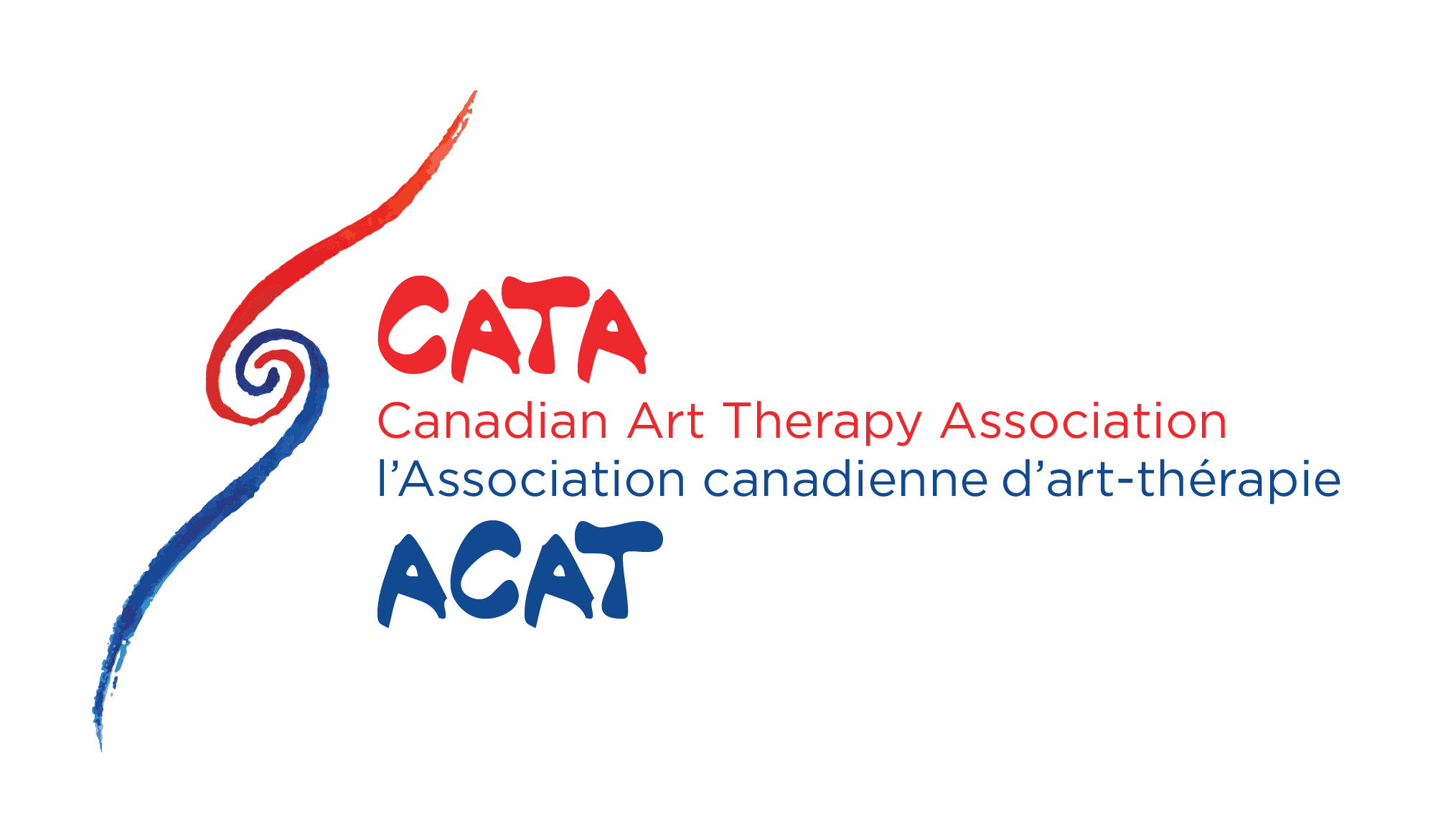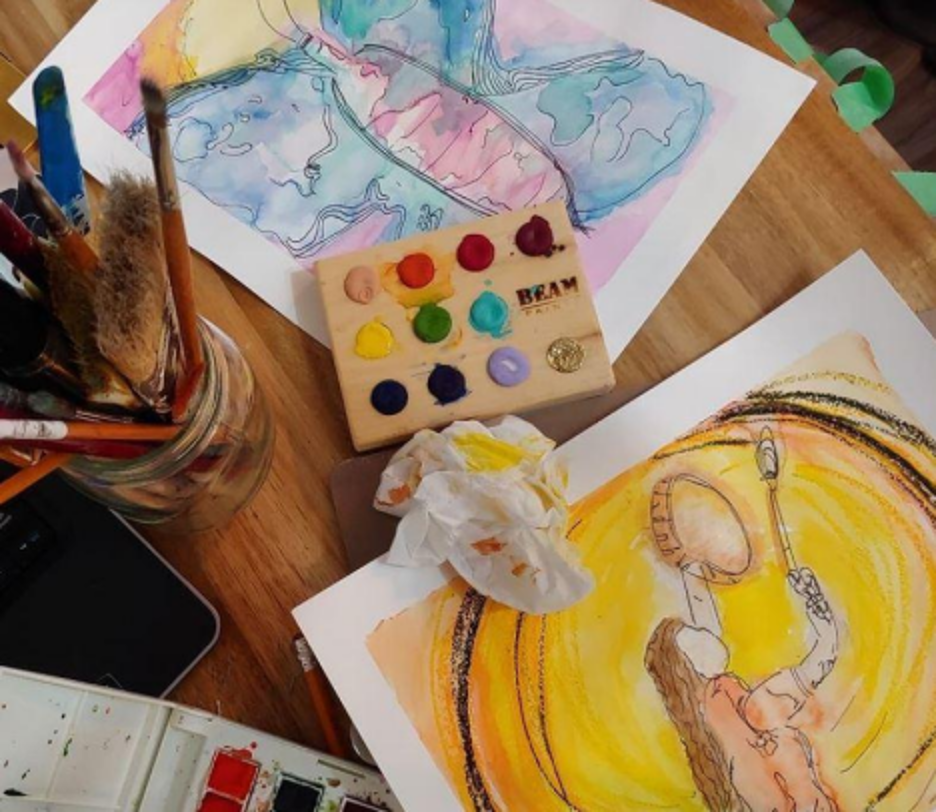Drama Therapy: Interview with Rowena Tam
Art Therapy Conversations is a regular column in Envisage, developed and written by Rebecca Montgomery. We thank Rebecca for her dedication and creativity in facilitating learning and expanding connections between art therapists! In this issue, we are very excited to be expanding into the creative arts therapies world for a brief moment to connect with drama therapist, Rowena Tam. Rowena shared with Rebecca about her personal artistic practice, her experience as a drama therapist, and her collaboration with the CCPA’s Creative Arts In Couselling and Psychotherapy Chapter for their ongoing speaker series, Creative Arts Therapists Against White Supremacy.
Rowena Tam, MA, C.C.C., is a drama therapist, researcher, and guest living and working in Tiohtiá:ke/Mooniyaang/Montreal, on unceded Kanien’kehá:ka territory. Rowena has clinical experience working in public and private practice with frontline workers at Indigenous-serving organizations, immigrant and refugee youth, women in prison, as well as neurotypical and neurodiverse children and adults. Rowena is the past-president of the CCPA’s Creative Arts in Counselling and Psychotherapy Chapter.
Rebecca’s narratives in italics below.
Hello from snowy/slushy Vancouver! Thank you, Rowena, for joining me in conversation. It’s been a surprisingly snowy winter here on the west coast! How are you fairing the Canadian winter?
Hello Rebecca! Thank you for the warm welcome. We’ve had quite the chilly few weeks here in Montreal, with temperatures dipping below -30! Living in this city has prepared me for the cold, so I’d like to think I’m faring it okay!
In one word, how are you feeling at this moment?
Lucid.
“The use of emotional abstraction, physical intricacy and socio-aesthetic dimensions to performance led me to believe that the dramatic arts have the potential to play a significant role in healing and health.”
With the abundance of modalities in Creative Therapies, what drew you to drama therapy (and becoming a drama therapist!)?
As a former deviser, director and performer, I loved being a part of collective creations and theatre productions where I could engage in collaborative rehearsals and play with elements like imagination, voicework, choreography, playwriting, the visual arts, and more. The use of emotional abstraction, physical intricacy and socio-aesthetic dimensions to performance led me to believe that the dramatic arts have the potential to play a significant role in healing and health. This was reinforced through encounters, witnessing, and experiencing the powerful tools embedded within theatre processes.
You have worked with a variety of places and people, in public and private practice with frontline workers at Indigenous-serving organizations, immigrant and refugee youth, women in prison, as well as neurotypical and neurodiverse children and adults. Where are you working now?
I continue to work with the Montreal Indigenous Community NETWORK, in private practice, and at Concordia University blending together drama therapy, research, and strategic project development.
Has your previous experience informed what you do currently? Absolutely.
I see that you are a past president of the CCPA, Creative Arts in Counselling and Psychotherapy Chapter! What inspired you to become part (or start?) of this chapter?
I was in my first year of my MA in drama therapy when I saw the call-out for a position with the CCPA’s Creative Arts in Counselling and Psychotherapy Chapter. I joined with the purpose of connecting with other creative arts therapists across settler-colonial Canada and to learn about their endeavours. I’m grateful to have made some wonderful new friends within the creative arts therapies field through this position and I look forward to meeting up with some of them beyond the virtual realm soon.
I also noticed that you recently had a seminar with CCPA, “Creative Arts Therapists Against White Supremacy”! How did it go?
This past week I had the opportunity to speak on the ways in which creative arts therapists uphold and perpetuate forms of policing for ourselves, our colleagues, and our clients. The presentation, Against cop sh*t in the creative arts therapies, was inspired by the cheeky title from Jeffrey Moro’s essay on anti-policing and anti-surveillance within the classroom. I focused on the weaponization of language (especially the lingo we have adopted within the mental health field), institutional harm, and how professionalism is steeped within white supremacy culture. I would like to think it went well – although you might have to ask the attendees, organizers and facilitators as there will be a follow-up discussion session on February 9, 2022, with the attendees from my speaker session.
Do you have any future seminars coming up that people can attend?
I will be presenting an experiential workshop alongside a fellow drama therapist at the Canadian Counselling and Psychotherapy Association’s Annual Conference in Charlottetown (May 2022) on racial trauma in the creative arts therapies. People interested in learning more or attending can check out the conference schedule. I believe the full schedule should be posted on the website soon.
What are you working on for your PhD?
Back when I was working in a women’s prison, I noticed the lack of drama therapeutic tools to address and support my practice whilst working with incarcerated Black, Indigenous, and women of colour. I decided to return to school to fill the gap in research to address what I (and others) did not have and to uncover ways that drama therapy can offer anti-carceral alternatives to the mental health field.
“I am so blessed to be surrounded by so many talented and loving creatives who produce inspiring and compelling sociopolitical work rooted in their exploratory feelings and stories around family, diaspora, and cultural loss.”
Do you have your own artistic practice?
I try to create response art in both my professional and academic practices. And aside from these artmaking sessions, I may be part of an upcoming ensemble for a theatre production taking place April 2022! Stay tuned!
Is there an artist who inspires you?
There are an endless number of artists who inspire me! I wouldn’t be able to name just one, and I fear missing naming anyone, so I will let them sift through my mind for now. (This question has encouraged me to create a list). The first people that came to mind are my friends. I am so blessed to be surrounded by so many talented and loving creatives who produce inspiring and compelling sociopolitical work rooted in their exploratory feelings and stories around family, diaspora, and cultural loss. I believe that their artwork speaks volumes not only to me but also to the experiences of many others as well.
What are some ways you prioritize mental wellness?
I unfortunately do not prioritize mental wellness as much as I should. I think this sentiment transverses the mental health field, as many creative arts therapists have also expressed feeling the weight of our society’s collapse on them repeatedly. We show up and do this work amidst the bedlam because we care. With that being said, I try my best to do at least one outdoorsy adventure per week, in addition to moving and grooving at home. So far, my go-to’s include finding new frozen ponds and lakes to skate in and hiking up the mountain.
Thank you Rowena, it is very cool and inspiring to see the work you’ve done. As someone who is currently working on their MA in Art Therapy application, I feel heartened to know I’m coming into a field of exciting work with kind and intelligent people such as yourself!
Thank you again Rebecca, for this opportunity. I wish you all the best with your art therapy application and hope to see you around in the ever-growing creative arts therapies field.




